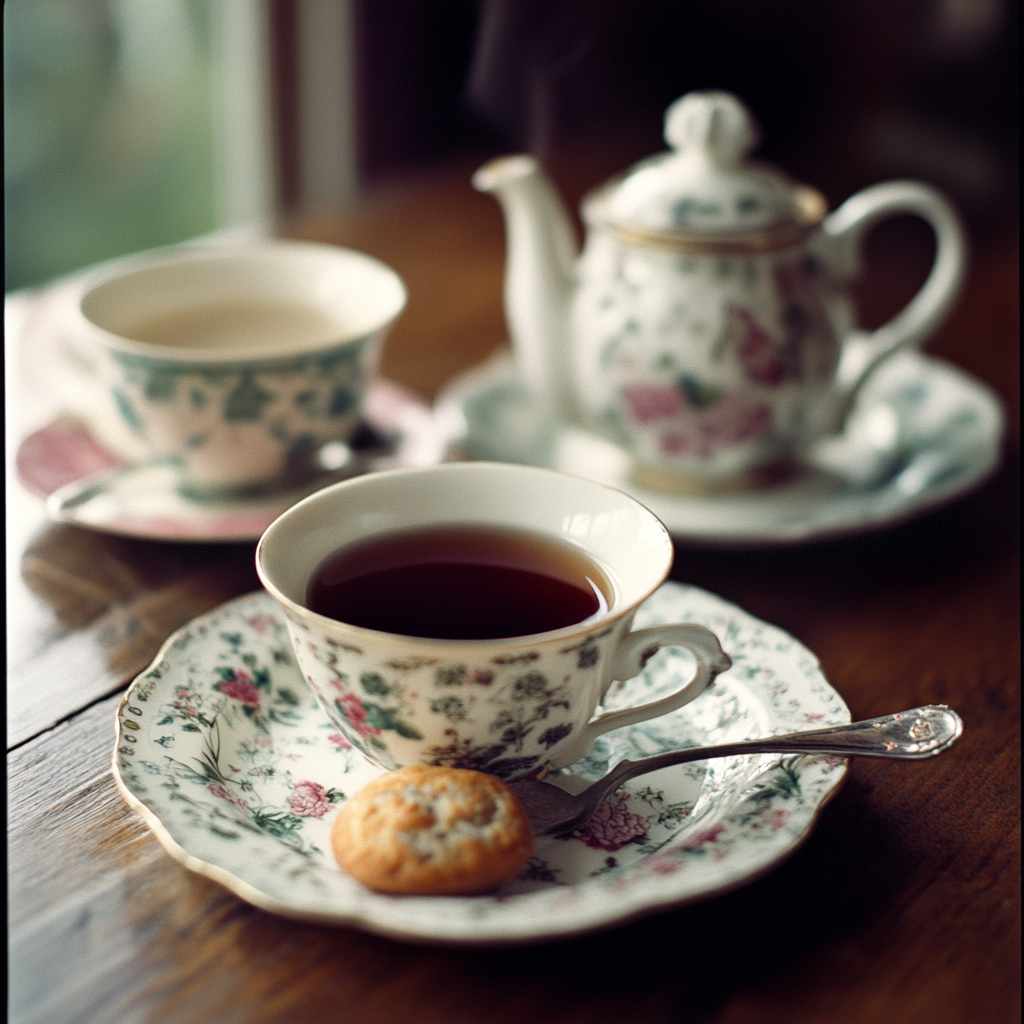Introduction
English Breakfast Tea is more than just a morning beverage; it’s a cultural emblem, a health booster, and a versatile companion to countless meals. From its rich history to its diverse blends and nutritional perks, this tea has a story to tell. Whether you’re a tea connoisseur or simply curious about its appeal, this article will dive deep into the origins, benefits, brewing tips, and ideal pairings of English Breakfast Tea. By the end, you’ll be ready to brew the perfect cup and savor every sip. Let’s begin!
Understanding English Breakfast Tea
What Is English Breakfast Tea?
English Tea, a robust blend of black teas, is widely known for its bold flavor and full-bodied aroma. Typically, it’s a mix of Assam, Ceylon, and Kenyan teas; moreover, this combination gives it a harmonious balance of malty, citrusy, and earthy notes. Consequently, its distinct taste has made it not only a favorite but also a staple in many households worldwide.
Definition and Composition
English Breakfast Tea isn’t just one type of tea; rather, it’s a blend of several varieties that come together to create a harmonious flavor profile. In fact, most blends include Assam tea for its malty undertones; furthermore, they incorporate Ceylon tea for its brisk and bright flavor, as well as Kenyan tea for its rich color and aroma. As a result, each sip offers not only a delightful experience but also a perfect balance of strength and smoothness.
Historical Origins
The roots of English Breakfast Tea trace back to the 19th century when it was designed to complement hearty English breakfasts. The blend is often credited to Scottish tea master Robert Drysdale, though others suggest it was popularized in the United States. Regardless of its origin, the tea’s boldness and versatility made it a breakfast staple across continents.
Cultural Significance in the UK
In Britain, English Tea is more than just a drink; it’s a ritual. Traditionally served with milk and sugar, it complements morning meals and provides a comforting start to the day. Its enduring popularity is a testament to the British love for tea and its role in fostering social connections.
Varieties and Blends
Exploring the Varieties of Breakfast Tea
Although the classic blend of English Breakfast Tea is well-known, different tea producers have their own unique interpretations. These variations are crafted by adjusting the proportions of Assam, Ceylon, and Kenyan teas or incorporating other black tea varieties.
Regional Differences in Blends
The flavor of English Tea can change based on regional influences:
- Assam-based blends offer a strong, malty flavor, ideal for those who prefer a robust cup.
- Ceylon-forward blends are lighter with a citrusy and floral undertone, appealing to those who enjoy a crisp finish.
- Kenyan-heavy blends provide a deep, earthy richness with bold color, making them visually striking and flavorful.
These differences not only cater to various palates but also highlight the unique characteristics of tea-growing regions.
Popular Brands and Their Unique Blends
Some popular tea brands, such as Twinings, PG Tips, and Yorkshire Tea, have set benchmarks in the world of English Breakfast Tea. Each brand crafts its blends to create a signature flavor profile. For instance:
- Twinings offers a smooth and slightly sweet version, perfect for newcomers to black tea.
- Yorkshire Tea is bold and hearty, designed for milk enthusiasts.
- Harney & Sons add a touch of smokiness to their English Breakfast blend, offering a distinct twist.
These choices make it easy for tea lovers to find a brand and blend that aligns with their tastes.
Health Benefits and Nutritional Information
The Health Benefits of English Tea
Beyond its bold flavor and comforting warmth, English Breakfast Tea offers an array of health benefits. Packed with antioxidants and moderate caffeine, it supports overall well-being while providing an energizing start to your day.
Antioxidant Properties
English Breakfast Tea is rich in antioxidants like polyphenols and flavonoids, which help combat oxidative stress in the body. These compounds are linked to reduced risks of chronic diseases, such as heart conditions and certain types of cancer. Incorporating this tea into your routine can bolster your body’s defenses against free radicals.
Impact on Heart Health
Research has shown that regular consumption of black tea can significantly improve heart health. Specifically, its flavonoids not only promote better circulation but also lower LDL cholesterol levels and, furthermore, help maintain healthy blood pressure. Consequently, sipping on a cup of English Breakfast Tea could be both a simple and enjoyable way to consistently support cardiovascular well-being.
Role in Weight Management
If you’re looking for a beverage to complement a healthy diet, English Breakfast Tea might be a great choice. Moreover, the caffeine and catechins in the tea can enhance metabolism and, in addition, support fat oxidation, which ultimately aids in weight management. For the best results, pair it with a balanced meal; furthermore, this combination can make its effects even more effective.
Caffeine Content and Its Effects
While English Breakfast Tea contains less caffeine than coffee, it provides a gentle energy boost without causing the jitters. A typical cup contains about 40–70 mg of caffeine, enough to improve focus and alertness without overwhelming your system. For those who want a steady energy release, this tea is a perfect pick.
Brewing the Perfect Cup
How to Brew English Tea Like a Pro
Brewing the perfect cup of English Tea is both an art and a science. By paying attention to the quality of ingredients and following precise techniques, you can unlock the full flavor potential of this classic tea.
Selecting Quality Tea Leaves
The foundation of a great cup lies in choosing high-quality tea leaves. Loose-leaf tea is often preferred for its freshness and superior flavor compared to tea bags. Look for leaves that are dark, well-twisted, and fragrant for the best results.
Water Quality and Temperature
Using the right water can make or break your brew. Filtered water free of impurities enhances the tea’s natural flavors. The temperature should be just shy of boiling—around 200°F (93°C)—to prevent bitterness while extracting the rich, robust notes.
Steeping Time and Techniques
The ideal steeping time for English Tea is 3–5 minutes. Steeping for too long can make the tea overly astringent, while shorter times may result in a weaker flavor. Stir gently while steeping to ensure an even infusion.
Adding Milk, Sugar, or Lemon
While purists may prefer their tea plain, English Breakfast Tea pairs beautifully with milk or sugar for a classic British touch. Adding a slice of lemon can create a refreshing twist, enhancing the tea’s citrusy undertones. Experiment with these additions to suit your personal taste.
Pairing English Breakfast Tea with Food
Perfect Pairings for English Tea
English Breakfast Tea is a versatile beverage that complements a wide variety of foods. Its bold, full-bodied flavor pairs seamlessly with both traditional and modern cuisines, making it an excellent choice for any mealtime.
Traditional Breakfast Foods
True to its name, English Tea is an ideal companion to a hearty morning meal. It pairs beautifully with:
- Toast with butter and jam
- Scrambled eggs or omelets
- Scones with clotted cream and marmalade
The tea’s robust flavor cuts through the richness of these dishes, creating a harmonious balance.
Afternoon Tea Accompaniments
During afternoon tea, English Breakfast Tea is often served with delicate treats that enhance its flavor profile. Popular pairings include:
- Tea sandwiches (e.g., cucumber, smoked salmon)
- Sweet pastries like éclairs and macarons
- Classic desserts such as Victoria sponge cake
These light snacks provide a delightful contrast to the tea’s earthy undertones.
Modern Pairing Ideas
For a contemporary twist, try pairing English Tea with dishes like:
- Savory quiches or tarts
- Grilled vegetable paninis
- Vegan treats like banana bread or almond cookies
These combinations show just how versatile this tea can be, fitting seamlessly into modern dining habits.
Frequently Asked Questions About English Breakfast Tea
Common Questions About English Breakfast Tea
Curious about the nuances of English Tea? If so, here are answers to some of the most frequently asked questions. Additionally, these insights will help you better understand this beloved beverage and its unique appeal.
What is the origin of English Breakfast Tea?
English Tea originated in the 19th century and is often credited to tea master Robert Drysdale. Its blend was designed to complement hearty English breakfasts, but its popularity quickly spread globally, making it a staple in households everywhere.
How much caffeine does English Tea contain?
English Tea typically contains 40–70 mg of caffeine per cup; moreover, the exact amount varies depending on the blend and brewing time. As a result, this makes it an excellent choice for those who want a gentle energy boost. Furthermore, it provides a steadier option without the high caffeine levels often found in coffee.
Can Breakfast Tea aid in weight loss?
Yes, the caffeine and catechins in English Tea can help boost metabolism and support fat oxidation. When paired with a balanced diet and regular exercise, it can complement weight management efforts effectively.
What are the health benefits of English Breakfast Tea?
Packed with antioxidants, English Tea helps combat oxidative stress, supports heart health, and may improve focus and digestion. It’s a wholesome beverage that offers both pleasure and health benefits in every sip.
How should English Breakfast Tea be stored?
To maintain its freshness and flavor, you should store English Tea in an airtight container; furthermore, ensure it is kept away from light, heat, and moisture. Additionally, a cool, dark cupboard is ideal for preserving its quality and preventing any loss of aroma or taste over time.
Is English Breakfast Tea suitable for vegans?
Absolutely! English Tea itself is vegan. However, if you enjoy it with milk, consider plant-based options like almond, oat, or soy milk to keep your tea vegan-friendly.
Conclusion and Final Thoughts
Why English Breakfast Tea Deserves a Place in Your Daily Routine
English Tea isn’t just a drink; instead, it’s an experience steeped in tradition, flavor, and versatility. Moreover, from its humble beginnings as a breakfast staple to its eventual rise to global popularity today, this robust tea has undeniably earned its spot in the hearts, as well as the cups, of tea lovers everywhere.
By exploring its historical origins, understanding its health benefits, and mastering the art of brewing, you can truly appreciate everything this tea has to offer. Whether paired with a traditional English breakfast, an afternoon tea spread, or modern dishes, its adaptability shines through. Plus, its antioxidant-rich properties make it as nourishing as it is delightful.
So, why not make English Tea a part of your daily ritual? With every sip, you’re not just enjoying a beverage—you’re partaking in a rich history and a timeless tradition.

